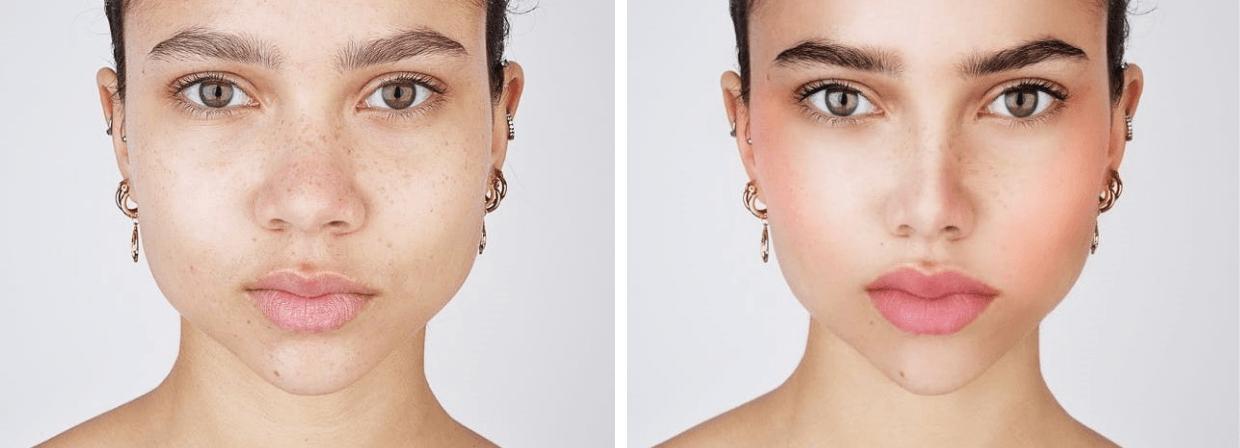The dangers of photo-editing in a social media obsessed world
Instagram. Snapchat. Facebook. These holy trinity of social media platforms have transformed the way we present ourselves, and how we are received by others. The growth of selfie culture is perhaps the most shocking consequence of these platforms, promoting a world obsessed by money, beauty, power and fame. Apps such as Photoshop and FaceTune are leading the way for unrealistic beauty standards, and are therefore partly to blame for the growing epidemic of body dysmorphia and mental health issues among young people today.
In an attempt to expose this growing trend, the British fashion photographer John Rankin Waddell, known professionally as Rankin, launched a social experiment which he aptly named “Selfie Harm”. In this series, Rankin asked 15 teenagers to edit and retouch portraits of themselves until they considered the photos to be “social media ready”. The results were truly shocking.
Posting a #NoMakeupSelfie is considered an almost revolutionary act
Displayed next to each other, Rankin’s untouched portraits show naturally beautiful women against cartoonish and doll-like caricatures. Bulging eyes and pouty lips, opened slightly to reveal teeth that could blind a person, feature in these retouched photographs, highlighting the sad reality of beauty standards in a social media obsessed world.
These portraits are of course a by-product of wider mental health issues relating to social media, such as body dysmorphia and social anxiety. We are trained by these standards of beauty to not only hide our flaws, but to blur them out completely. Even our most natural features are somehow heightened by filters and touch ups, and posting a #NoMakeupSelfie is considered an almost revolutionary act.
Rankin has said that this cult of the selfie is “just another reason why we are living in a world of FOMO, sadness, increased anxiety, and Snapchat dysmorphia”. It is true that social media use has been linked to the development of mental health problems such as anxiety, depression and eating disorders. Having suffered from all three myself, I know too well the short-lived satisfaction felt after receiving over 100 likes on an Instagram post, or reading a comment telling me how “skinny” I look.
How can we tell what is real and what is not?
However, as Rankin says, “It’s time to acknowledge the damaging effects that social media has on people’s self-image,” and we cannot do that without recognising the role played by “retouching” apps. In the past, we needed advanced Photoshop knowledge to edit and distort photos, but, now, editing apps can be downloaded for free and are easy to use. Apps such as FaceTune make it so simple to produce these cartoon-like images of ourselves, and that’s what makes them so much more dangerous.
The creator of FaceTune, Zeev Farbman has said that “we did not create FaceTune for body manipulations, but I’m not sure it’s our place to decide how people use the app”. For Farbman, “Social media is not a reality show, it’s a director’s cut of your life, and some people are more successful in creating that director’s cut than others”. Yet, if our public and private selves become as distanced from each other as Farbman suggests, how can we tell what is real and what is not? Surely this is the foundation of what we know to be dysmorphia, from both a physical and psychological perspective.
We need to bridge the gap between the real and online worlds, and accept that no amount of editing or retouching should affect our worth
I am yet to use an app like FaceTune myself, but I know of those who cannot live without them. A friend of mine once took a photo of me and decided to whiten my teeth and airbrush my skin before posting it to Instagram. It appears that, in today’s world, our self-image has become entirely dependent on the number of likes, retweets or shares we receive, and this distorts the way we see ourselves in the real world.
A mantra my mother has instilled in me from a young age is that self-love is not enough anymore, we need self-worth. These images are not necessarily indicative of how we’d like to see ourselves, but rather how we’d like others to see us. As a society, we need to bridge the gap between the real and online worlds, and accept that no amount of editing or retouching should affect our worth. It is our diversity as human beings that makes us who we are.

Comments